*/
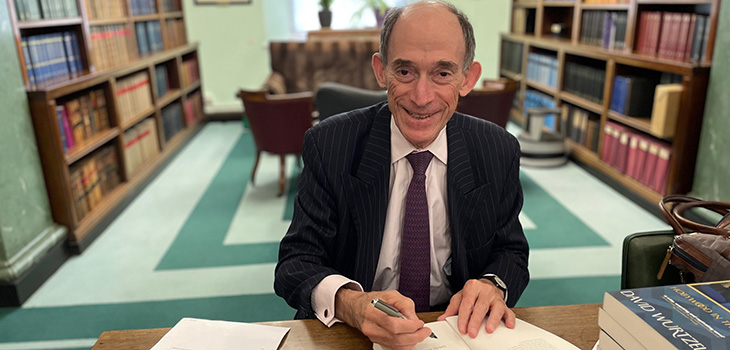
I was born in Hollywood. Jewish children in Los Angeles in those days were born in Cedars of Lebanon Hospital which was located in the part of town that was unquestionably Hollywood. As it happens, since 1917 my father’s family had worked in the movies, at what became 20th Century Studios. Until the age of 13, when I needed a haircut my mother would drive me to the barber’s shop on the Fox lot. We also used the dentist who practised out of Shirley Temple’s former bungalow.
My first cultural experiences were thus film and being taken to the movies. In due course my preferences shifted from the 1950s to the golden age of the 1930s-40s including any movie which co-stars Cary Grant and Katharine Hepburn. I remain devoted to the great American musicals in which pantheon I also place Sondheim. He has been produced brilliantly on the English stage, attracting actors who can do anything (I have seen Judi Dench in A Little Night Music and as Cleopatra; Adrian Lester in Company and as Othello). I also enjoyed Sondheim’s shows at RADA, whose students (among the most diverse I have witnessed) have a knack for it.
I had an inspiring American literature teacher in high school who introduced me to Faulkner, Hawthorne, Dickinson and Eugene O’Neill. Fitzgerald, Hemingway and Anne Tyler would come later. And in due course, Waugh, Trollope, Jane Austen and Zola.
When I arrived in England for my junior year abroad I discovered an unsatisfied – soon to be insatiable – love of theatre and something called opera. The latter started well with The Magic Flute. I will see anything by Mozart, Richard Strauss and Benjamin Britten. Sadly, we are now in the era of ‘director’s opera’ and peculiar interpretations. But choice has greatly expanded with the growth of summer opera festivals, all of whom do massive outreach to young people. One’s taste in music is a matter of individual preference. It has nothing to do with education or class. Listen to the young singers being interviewed on Radio 3. They are not elitist. They happen to have a huge love and understanding of music, and when they are good they bring the audience with them. And hands up, I go to Bayreuth. Sitting in that non-air conditioned festival hall at the height of summer, with the astonishing acoustics, and among fellow pilgrims who have made the effort to travel to be there adds to the emotional impact of the music.
One of the happiest years of my life was being a lay member of the Laurence Olivier Awards Panel, which allowed me free stalls seats to 97 productions in 13 months. It taught me to appreciate each genre on its own terms, from King Lear to Nunsense. Over the years I have seen 25 Hamlets because when 25 actors (men and women) speak Shakespeare’s words, you see something new in them each time. Nowadays respect for the text is ebbing. The more modern writers have been treated more kindly. I remain a devoted Shavian, I adore Noel Coward and Alan Bennett and look forward to the next James Graham or Mike Bartlett.
When I returned to England and took the unprecedented step in my family of becoming a barrister, all these cultural longings could be satisfied. Plays have a dramatic arc to them. Trials do as well. The feeling inside court as the evidence unfolds was as exciting as the feeling in a theatre as the actors connected to the audience. I started asking myself ‘What is this case all about? Where is the motivation?’ My opponents attacked me for being an amateur psychologist. But understanding that people don’t always weigh up the alternatives or consequences before doing something, seemed more helpful to the jury than defence counsel submitting ‘who would do this?’ when the issue was who did it, not whether a crime had been committed.
Could anyone spend their professional life in an Inn without becoming hooked on history and architecture? I joined the Georgian Group 40 years ago, then the Furniture History Society and now the Decorative Arts Society, touring with groups at home and abroad that include curators who share knowledge and help you to see things you might otherwise not appreciate. Not unlike listening to barristers at the top of their game.
My novel, The Chosen City, has had a long gestation. It is a saga about a Jewish family who own a motion picture studio, narrated by the outsider member of the family. I began with some of my own family stories but created a narrator who was nothing like me. It also deals with belonging and acceptance. Having spent most of my life as an immigrant who admires the culture of another country, I hope I can understand that.
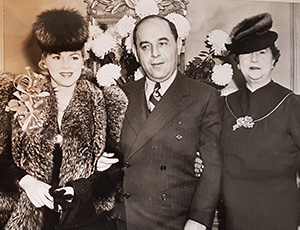
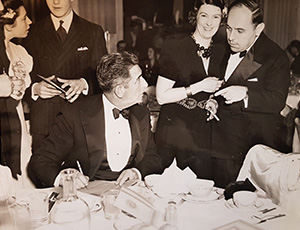
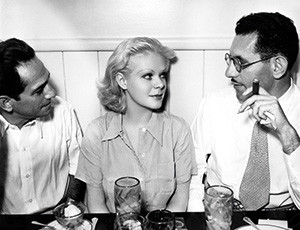
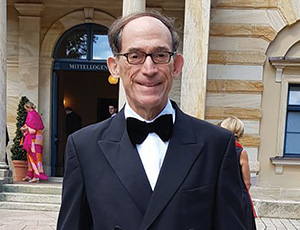
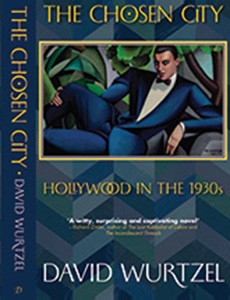
The Chosen City (Discript Ltd: September 2023): Bobby Steingrove is an outsider. His Jewish family runs their own motion picture studio in 1930s Hollywood, but Bobby’s father is dependent on the charity of his producer brother, who pays for Bobby to go to Yale. There he falls in with a moneyed set of amoral young men but dramatic misunderstandings destroy his social success, Bobby returns to work in his uncle’s film studio. When a friend publishes a novel with a thinly disguised Bobby as a protagonist, and his uncle’s biggest star insists on it becoming a film vehicle for her, he suddenly finds he has the chance to be an insider. But is that what Bobby really wants?

I was born in Hollywood. Jewish children in Los Angeles in those days were born in Cedars of Lebanon Hospital which was located in the part of town that was unquestionably Hollywood. As it happens, since 1917 my father’s family had worked in the movies, at what became 20th Century Studios. Until the age of 13, when I needed a haircut my mother would drive me to the barber’s shop on the Fox lot. We also used the dentist who practised out of Shirley Temple’s former bungalow.
My first cultural experiences were thus film and being taken to the movies. In due course my preferences shifted from the 1950s to the golden age of the 1930s-40s including any movie which co-stars Cary Grant and Katharine Hepburn. I remain devoted to the great American musicals in which pantheon I also place Sondheim. He has been produced brilliantly on the English stage, attracting actors who can do anything (I have seen Judi Dench in A Little Night Music and as Cleopatra; Adrian Lester in Company and as Othello). I also enjoyed Sondheim’s shows at RADA, whose students (among the most diverse I have witnessed) have a knack for it.
I had an inspiring American literature teacher in high school who introduced me to Faulkner, Hawthorne, Dickinson and Eugene O’Neill. Fitzgerald, Hemingway and Anne Tyler would come later. And in due course, Waugh, Trollope, Jane Austen and Zola.
When I arrived in England for my junior year abroad I discovered an unsatisfied – soon to be insatiable – love of theatre and something called opera. The latter started well with The Magic Flute. I will see anything by Mozart, Richard Strauss and Benjamin Britten. Sadly, we are now in the era of ‘director’s opera’ and peculiar interpretations. But choice has greatly expanded with the growth of summer opera festivals, all of whom do massive outreach to young people. One’s taste in music is a matter of individual preference. It has nothing to do with education or class. Listen to the young singers being interviewed on Radio 3. They are not elitist. They happen to have a huge love and understanding of music, and when they are good they bring the audience with them. And hands up, I go to Bayreuth. Sitting in that non-air conditioned festival hall at the height of summer, with the astonishing acoustics, and among fellow pilgrims who have made the effort to travel to be there adds to the emotional impact of the music.
One of the happiest years of my life was being a lay member of the Laurence Olivier Awards Panel, which allowed me free stalls seats to 97 productions in 13 months. It taught me to appreciate each genre on its own terms, from King Lear to Nunsense. Over the years I have seen 25 Hamlets because when 25 actors (men and women) speak Shakespeare’s words, you see something new in them each time. Nowadays respect for the text is ebbing. The more modern writers have been treated more kindly. I remain a devoted Shavian, I adore Noel Coward and Alan Bennett and look forward to the next James Graham or Mike Bartlett.
When I returned to England and took the unprecedented step in my family of becoming a barrister, all these cultural longings could be satisfied. Plays have a dramatic arc to them. Trials do as well. The feeling inside court as the evidence unfolds was as exciting as the feeling in a theatre as the actors connected to the audience. I started asking myself ‘What is this case all about? Where is the motivation?’ My opponents attacked me for being an amateur psychologist. But understanding that people don’t always weigh up the alternatives or consequences before doing something, seemed more helpful to the jury than defence counsel submitting ‘who would do this?’ when the issue was who did it, not whether a crime had been committed.
Could anyone spend their professional life in an Inn without becoming hooked on history and architecture? I joined the Georgian Group 40 years ago, then the Furniture History Society and now the Decorative Arts Society, touring with groups at home and abroad that include curators who share knowledge and help you to see things you might otherwise not appreciate. Not unlike listening to barristers at the top of their game.
My novel, The Chosen City, has had a long gestation. It is a saga about a Jewish family who own a motion picture studio, narrated by the outsider member of the family. I began with some of my own family stories but created a narrator who was nothing like me. It also deals with belonging and acceptance. Having spent most of my life as an immigrant who admires the culture of another country, I hope I can understand that.





The Chosen City (Discript Ltd: September 2023): Bobby Steingrove is an outsider. His Jewish family runs their own motion picture studio in 1930s Hollywood, but Bobby’s father is dependent on the charity of his producer brother, who pays for Bobby to go to Yale. There he falls in with a moneyed set of amoral young men but dramatic misunderstandings destroy his social success, Bobby returns to work in his uncle’s film studio. When a friend publishes a novel with a thinly disguised Bobby as a protagonist, and his uncle’s biggest star insists on it becoming a film vehicle for her, he suddenly finds he has the chance to be an insider. But is that what Bobby really wants?


The Chair of the Bar sets out how the new government can restore the justice system
In the first of a new series, Louise Crush of Westgate Wealth considers the fundamental need for financial protection
Unlocking your aged debt to fund your tax in one easy step. By Philip N Bristow
Possibly, but many barristers are glad he did…
Mental health charity Mind BWW has received a £500 donation from drug, alcohol and DNA testing laboratory, AlphaBiolabs as part of its Giving Back campaign
The Institute of Neurotechnology & Law is thrilled to announce its inaugural essay competition
How to navigate open source evidence in an era of deepfakes. By Professor Yvonne McDermott Rees and Professor Alexa Koenig
Brie Stevens-Hoare KC and Lyndsey de Mestre KC take a look at the difficulties women encounter during the menopause, and offer some practical tips for individuals and chambers to make things easier
Sir Geoffrey Vos, Master of the Rolls and Head of Civil Justice since January 2021, is well known for his passion for access to justice and all things digital. Perhaps less widely known is the driven personality and wanderlust that lies behind this, as Anthony Inglese CB discovers
The Chair of the Bar sets out how the new government can restore the justice system
No-one should have to live in sub-standard accommodation, says Antony Hodari Solicitors. We are tackling the problem of bad housing with a two-pronged approach and act on behalf of tenants in both the civil and criminal courts